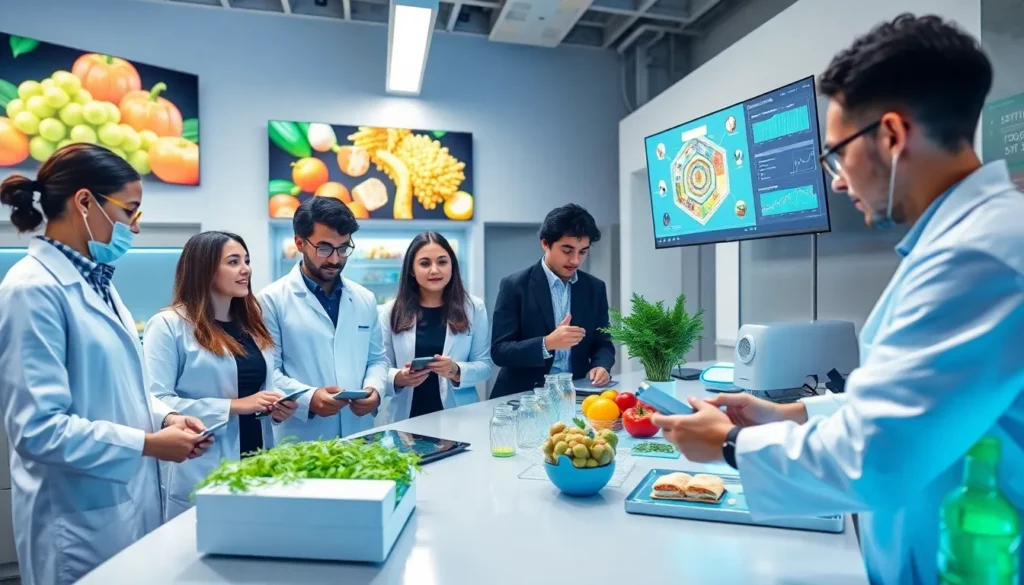When you think about the future of food, what comes to mind? Perhaps images of edible packaging or crops that thrive on minimal water? Innovative food science and emerging technologies are not just a couple of buzzwords to toss around at a dinner party: they represent the forefront of culinary evolution. Picture this: you sit down to dinner, and what you’re eating was designed not only to taste incredible but also to support your health and the environment. As whimsical as it sounds, that’s the delicious reality that cutting-edge food science is crafting right before our very eyes. In an era where popcorn-flavored soda seems normal, embracing these advancements is simply sensible. Let’s dig in and explore how this fascinating realm is shaping our nutrition and our future meals.
Table of Contents
ToggleThe Role Of Food Science In Modern Nutrition

Food science plays a crucial role in our daily nutrition, shaping what we eat and how we experience food. With its applications spanning from the lab to your kitchen, it ensures that our meals are not only tasty but nutritious. Imagine a world where your salad isn’t just crisp but loaded with vitamins and minerals enhanced through scientific innovation. This isn’t fantasy: it’s food science at work.
Nutritionists and scientists collaborate to understand how nutrients interact with our bodies. They study everything from how quinoa fits into a vegan diet to the best ways to extract nutrients from various food sources. Thanks to this ongoing research, consumers can access tailored diets based on their individual needs, lifestyle choices, and even their genetic predispositions.
Modern nutrition isn’t a one-size-fits-all approach. Food scientists design products targeting specific health issues, such as high cholesterol or diabetes, modifying ingredients to create healthier options. For example, fat substitutes and sugar replacements are commonly used in products like yogurt to lower calorie counts without sacrificing flavor. With ever-increasing awareness about health and wellness, the role of food science is more critical than ever.
Cutting-Edge Techniques In Food Development
The landscape of food development is shifting, influenced by groundbreaking techniques that promise to transform the way we think about our meals. In this section, we’ll highlight two particularly impactful methods that are making waves in the industry.
Biotechnology And Genetic Engineering In Agriculture
Biotechnology is revolutionizing agriculture, enabling scientists to modify crops genetically for improved yield and resistance to pests. Imagine tomatoes that can withstand extreme weather conditions or rice enriched with vitamins to combat malnutrition in developing countries. Genetic engineering is empowering farmers, providing them tools to produce healthier food more sustainably.
These developments are vital in the face of climate change, as they offer solutions to challenges like drought, salinity, and pest resistance. Crops that can thrive in adverse conditions mean more food security for all. When scientists tailor crops to meet nutritional needs, they’re not just enhancing the food supply: they’re paving the way for a healthier population.
Fermentation Technology And Its Benefits
On the other side of the spectrum, fermentation technology is experiencing a renaissance. This ancient process is not only making a comeback: it’s being innovated to deliver benefits that extend beyond flavor.
Fermentation adds probiotics to foods, which are essential for gut health. Think beyond yogurt: consider fermented beverages and plant-based options that are finding their way onto grocery store shelves. By harnessing modern techniques, food scientists are now able to control the fermentation process, enhancing flavors while maximizing health benefits like improved digestion and reduced inflammation.
The marriage of tradition and technology is showing us how to enjoy foods that are both delicious and beneficial.
Advancements In Food Preservation Methods
Among the many challenges facing the food industry, preservation remains a significant concern. Advancements in food preservation methods are crucial in ensuring safety, extending shelf life, and reducing food waste. Let’s explore the surprising influence of artificial intelligence in this domain.
The Impact Of Artificial Intelligence On Food Choices
AI is reshaping how we approach food preservation, offering smart solutions that keep our favorite foods fresh for longer. Algorithms analyze vast amounts of consumer data, optimizing storage conditions and determining the ideal shelf life for various products.
Beyond preserving food, AI assists in predicting trends and adjusting supply chains accordingly. This data-driven approach ensures that food reaches its destination at its freshest, minimizing the risk of spoilage. As a result, we get to enjoy lively, colorful produce rather than wilted remnants.
Sustainability And Environmental Considerations
In an age where environmental concerns loom large, sustainability is non-negotiable. Innovative food science approaches are tackling these concerns head-on, embracing sustainability in various ways that are as intricate as they are impactful.
One vital consideration is reducing food waste through better packaging solutions. Edible packaging is becoming more popular, offering a creative and eco-friendly alternative that aligns with contemporary consumer values. Imagine biting into an apple wrapped not in plastic, but in a skin-like material made entirely from fruit byproducts. These innovations not only reduce waste but also add to the charm of the dining experience.
Also, scientists are developing plant-based alternatives to traditional meat products, significantly reducing the environmental footprint of food production. These alternatives mimic the taste and texture of meat, addressing consumer concerns about sustainability without compromising on flavor. It’s a win-win for both our taste buds and our planet.
The Future Of Food: Trends And Predictions
As we look to the future, several trends in innovative food science stand out. Consumers are increasingly focused on health, sustainability, and convenience, pushing scientists and developers to evolve constantly.
Plant-based diets are here to stay, and with them, the development of cultured meats that promise to offer the same hearty flavors without the ethical dilemmas tied to traditional meat production. Farming practices are also set to transform with the rise of vertical farming, bringing food production into urban spaces and reducing the carbon footprint associated with transportation.
Also, personalized nutrition gained through DNA testing could become the norm. Imagine a future where your dietary recommendations are tailor-made based on your genetic profile. This blend of technology and nutrition could unlock unprecedented health benefits, pushing forward the boundaries of what food can do for us.





